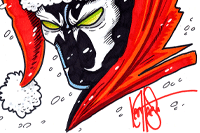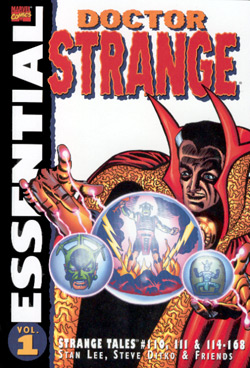|
 |
WAITING
FOR TOMMY: TALKING ABOUT STAN LEE
By
Richard Johnston
JORDAN:
It's a good question, because given our backgrounds at the
Journal, the obvious conclusion one might draw is that we're
out to get Stan or to expose him as a credit-hogging huckster,
or whatever. But the truth is that we approached this from
strict journalistic and cultural analytic angles, and tried
really hard to delve into his accomplishments (which are legion)
and persona, and to show them for what they really are. There
are many different views on Stan among comics professionals
and fans, and we made what we hope is a good attempt to bring
all those together in one place and to set the record straight.
Tom and I are journalists first, and comics fans second.
TOM
SPURGEON: I probably have more of a background as a critic,
but the general thrust of what Jordan says sounds right. It's
interesting, you know, the fact that people have these expectations
of what a book on Stan will be - or should be - speaks as
much to Stan's unique place in our culture as anything he's
ever done. I can't imagine writing a book about anyone else
in pop culture -- at least not in comics -- where half the
e-mails you get say, "Kick his ass!" and half the e-mails
say, "Leave him alone!"
But as
for what you're asking, I would say that we went into it just
wanting to understand him. What a weird life, you know?
RICHARD:
But, certainly from the extract I read, there's a real "ah,
here is the man, the man of myth, but no, he is brought low
by his own failed reality." Is that a misreading?
JORDAN:
No, not really.
RICHARD:
So is the "obvious conclusion" a valid one, despite all your
journalistic efforts?
TOM:
I hope we're a little more interesting than that. And it's
probably worth pointing out the obvious conclusion isn't really
that obvious to lots of people outside of comics, even today.
JORDAN:
Also, at the point in his life that the extract covers, which
was the late 1970s and early 1980s, when Stan was making inroads
into Hollywood, he really didn't have much success. There
are many reasons for that, which we discuss in the book. But
those failures on his part don't necessarily detract from
what he accomplished as a writer and editor in the early days
of the Marvel Age.
It's
simply that, later in life, when he tried to convert that
Marvel success into something grander and more meaningful,
he was largely unsuccessful. Oddly, he may be enjoying his
greatest non-comics success now, at 80 years old, with the
Stripperella and MGM deals, although that's probably attributable
in large part to the success of the Marvel movies and his
carefully cultivated association with the characters' origins.
Pages:
1 | 2
| 3 | 4
| 5 | 6
| 7 | 8
Continued Here... |
 |







